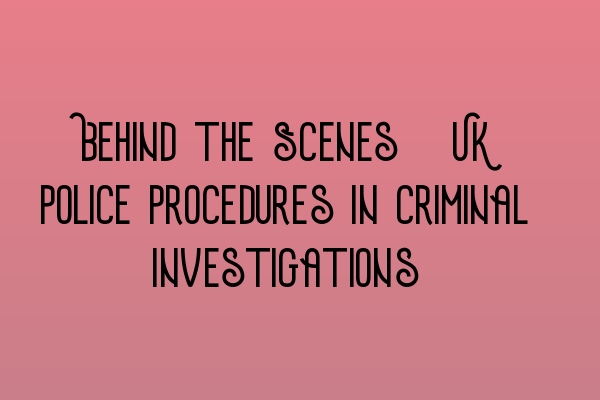Behind the Scenes: UK Police Procedures in Criminal Investigations
Welcome to the SQE Criminal Law & Practice Law UK blog! In this post, we will take you behind the scenes to explore the intricate procedures followed by UK police during criminal investigations. Understanding these procedures is crucial for aspiring criminal law practitioners preparing for the SQE exams. If you are planning to pursue a career in criminal law, it’s essential to have a solid grasp of how criminal investigations are conducted.
Before we dive into the details, it’s worth mentioning that SQE 1 Practice Exam Questions and SQE 1 Practice Mocks FLK1 FLK2 are valuable resources to test your knowledge and enhance your understanding. If you’re interested in preparing for the SQE exams, make sure to check out our SQE 2 Preparation Courses and SQE 1 Preparation Courses. Additionally, you can stay updated with the latest SRA SQE Exam Dates.
The Investigation Process
When a criminal offense is reported, the police play a pivotal role in conducting the initial investigation. The first step is to gather evidence and interview witnesses. This allows the police to collect relevant information and establish the circumstances surrounding the alleged crime.
Once the evidence is gathered, the police will analyze it to determine its relevance and admissibility in court. This analysis involves ensuring the evidence was obtained lawfully, and it meets the necessary requirements for use in legal proceedings.
During the investigation process, the police may employ various techniques such as surveillance, search warrants, and forensic analysis. Each step is carefully executed to ensure the integrity of the evidence and uphold the principles of justice.
Arrest and Detention
If the police have sufficient grounds to believe an individual is involved in a crime, they can make an arrest. The person arrested must be informed of the reasons for their arrest, their legal rights, and taken to a police station for further questioning. It’s crucial to understand arrest procedures and the rights of arrested individuals, as this knowledge is vital for criminal law practitioners.
Upon arrest, the police can detain individuals for a specified period for questioning and further investigation. During detention, the police must follow strict guidelines to respect the rights of the individuals and ensure their welfare. Understanding these guidelines is essential for criminal law practitioners who may represent clients during the detention process.
Charges and Court Proceedings
Once the investigation is complete, the police will assess the evidence and decide whether to charge a suspect. If charges are made, the case proceeds to court, where the defendant’s guilt or innocence will be determined. It’s important to note that the procedures followed by the UK police during the investigation phase significantly impact the subsequent court proceedings.
In court, the evidence collected by the police will be presented to support the prosecution’s case. The defense will have the opportunity to challenge the evidence and present their own arguments. A thorough understanding of police procedures is crucial for criminal law practitioners to effectively represent their clients and navigate the complexities of the legal system.
As we wrap up this behind-the-scenes exploration of UK police procedures in criminal investigations, we hope you have gained valuable insights into the intricacies of this process. Remember, knowledge and preparation are key when pursuing a career in criminal law. Make the most of SQE 1 Practice Exam Questions and SQE 1 Practice Mocks FLK1 FLK2 to test your understanding and solidify your knowledge. Check out our SQE 2 Preparation Courses and SQE 1 Preparation Courses to boost your exam readiness. Stay informed with the latest SRA SQE Exam Dates to plan your exam preparations effectively.
Thank you for reading, and we wish you all the best in your pursuit of a rewarding career in criminal law!
